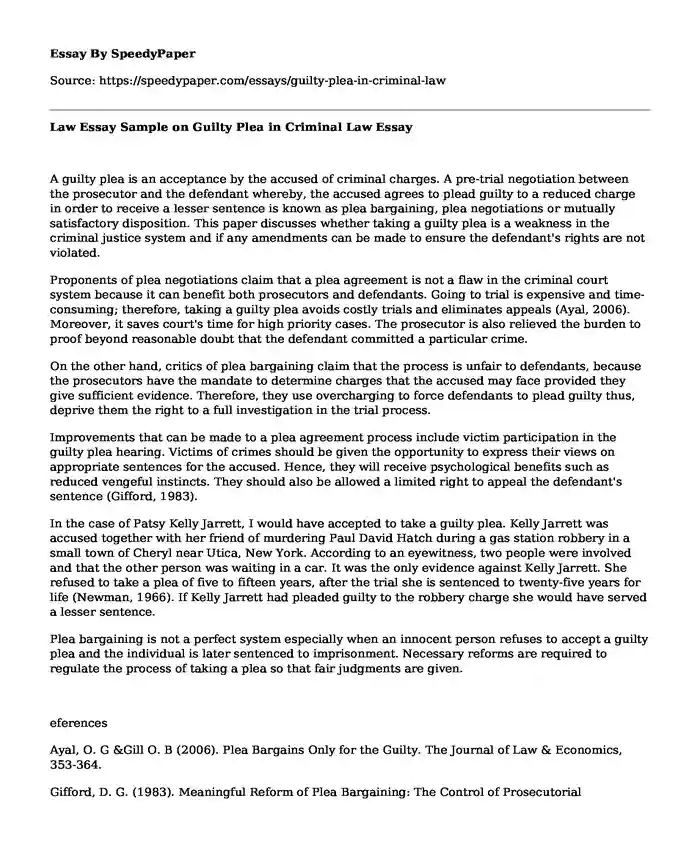
| Type of paper: | Essay |
| Categories: | Law Criminal law Judicial system |
| Pages: | 2 |
| Wordcount: | 482 words |
A guilty plea is an acceptance by the accused of criminal charges. A pre-trial negotiation between the prosecutor and the defendant whereby, the accused agrees to plead guilty to a reduced charge in order to receive a lesser sentence is known as plea bargaining, plea negotiations or mutually satisfactory disposition. This paper discusses whether taking a guilty plea is a weakness in the criminal justice system and if any amendments can be made to ensure the defendant's rights are not violated.
Proponents of plea negotiations claim that a plea agreement is not a flaw in the criminal court system because it can benefit both prosecutors and defendants. Going to trial is expensive and time-consuming; therefore, taking a guilty plea avoids costly trials and eliminates appeals (Ayal, 2006). Moreover, it saves court's time for high priority cases. The prosecutor is also relieved the burden to proof beyond reasonable doubt that the defendant committed a particular crime.
On the other hand, critics of plea bargaining claim that the process is unfair to defendants, because the prosecutors have the mandate to determine charges that the accused may face provided they give sufficient evidence. Therefore, they use overcharging to force defendants to plead guilty thus, deprive them the right to a full investigation in the trial process.
Improvements that can be made to a plea agreement process include victim participation in the guilty plea hearing. Victims of crimes should be given the opportunity to express their views on appropriate sentences for the accused. Hence, they will receive psychological benefits such as reduced vengeful instincts. They should also be allowed a limited right to appeal the defendant's sentence (Gifford, 1983).
In the case of Patsy Kelly Jarrett, I would have accepted to take a guilty plea. Kelly Jarrett was accused together with her friend of murdering Paul David Hatch during a gas station robbery in a small town of Cheryl near Utica, New York. According to an eyewitness, two people were involved and that the other person was waiting in a car. It was the only evidence against Kelly Jarrett. She refused to take a plea of five to fifteen years, after the trial she is sentenced to twenty-five years for life (Newman, 1966). If Kelly Jarrett had pleaded guilty to the robbery charge she would have served a lesser sentence.
Plea bargaining is not a perfect system especially when an innocent person refuses to accept a guilty plea and the individual is later sentenced to imprisonment. Necessary reforms are required to regulate the process of taking a plea so that fair judgments are given.
eferences
Ayal, O. G &Gill O. B (2006). Plea Bargains Only for the Guilty. The Journal of Law & Economics, 353-364.
Gifford, D. G. (1983). Meaningful Reform of Plea Bargaining: The Control of Prosecutorial Discretion. University of Illinois Law Review 37.
Newman, D. J. (1966). Conviction - The Determination of Guilt or Innocence Without Trial. 286.
Cite this page
Law Essay Sample on Guilty Plea in Criminal Law. (2019, Nov 06). Retrieved from https://speedypaper.net/essays/guilty-plea-in-criminal-law
Request Removal
If you are the original author of this essay and no longer wish to have it published on the SpeedyPaper website, please click below to request its removal:
- Free Essay on Community Development
- How the Imagination Is Used in Tim O'Brien's The Things They Carried
- The Landlady Essay Sample
- Positive First Impression - Career Essay Example
- Free Essay Sample on Municipal Situation
- Paper Example: Analysis of 'The Metamorphosis'
- Contingent Loss Due to Law Suit. Paper Sample
Popular categories




